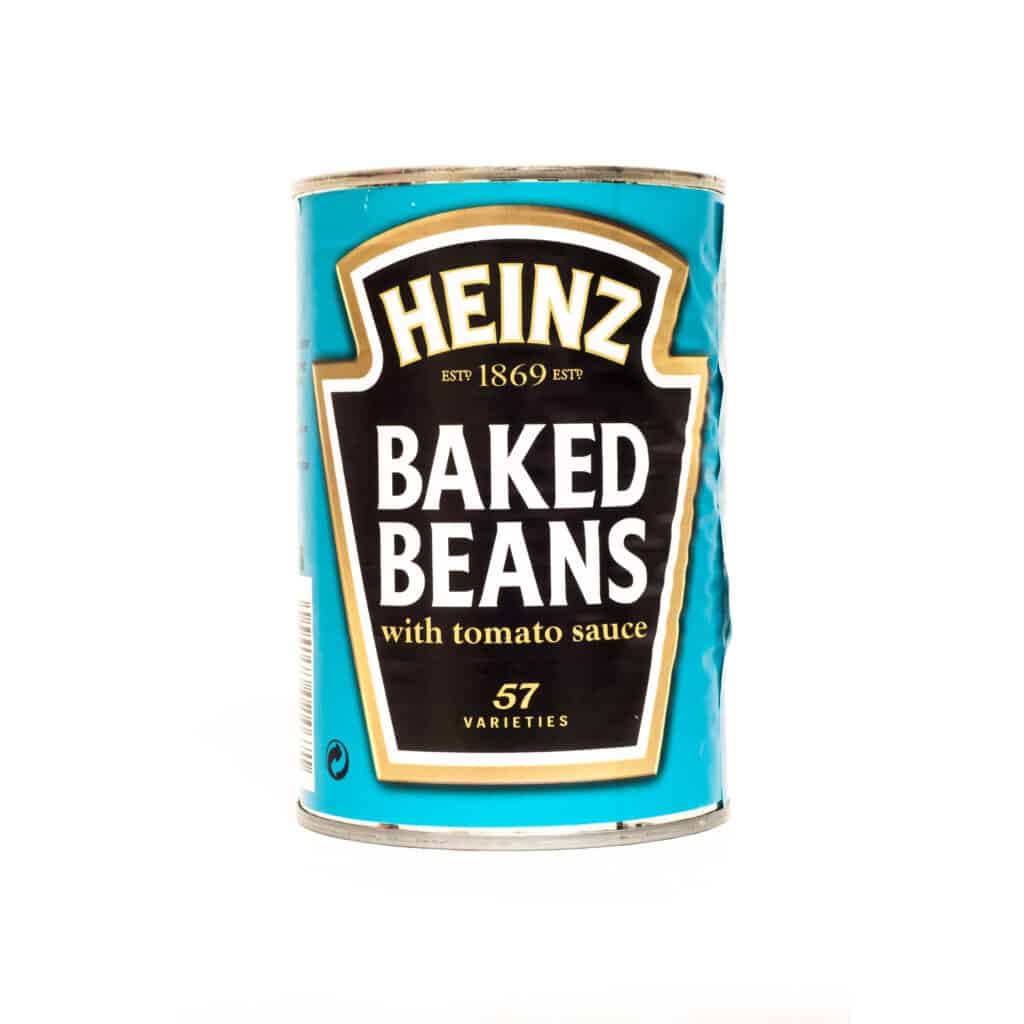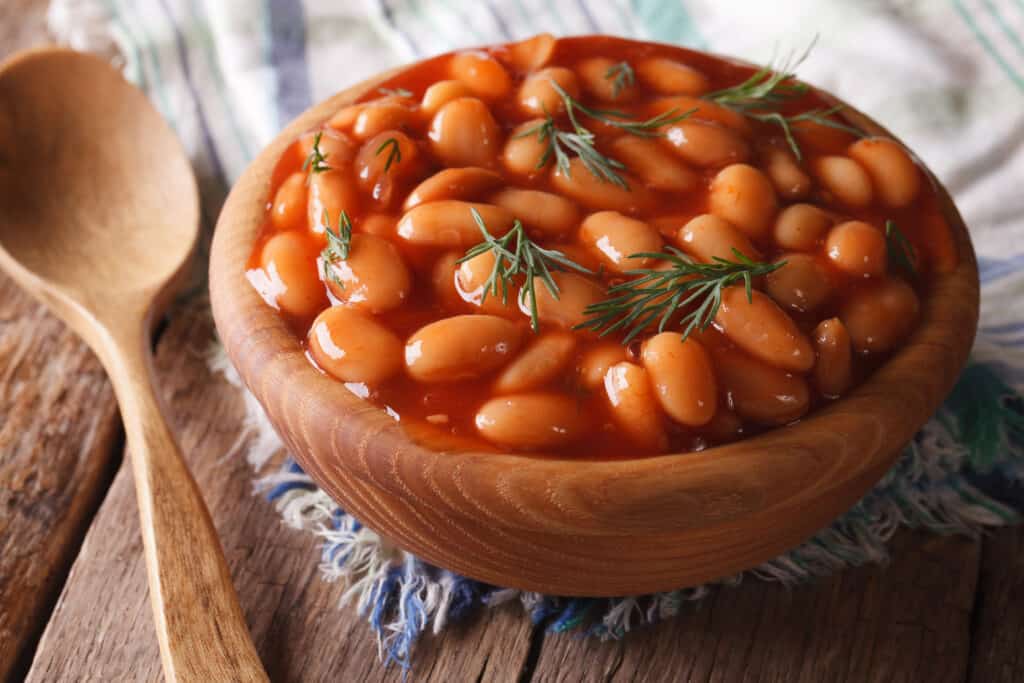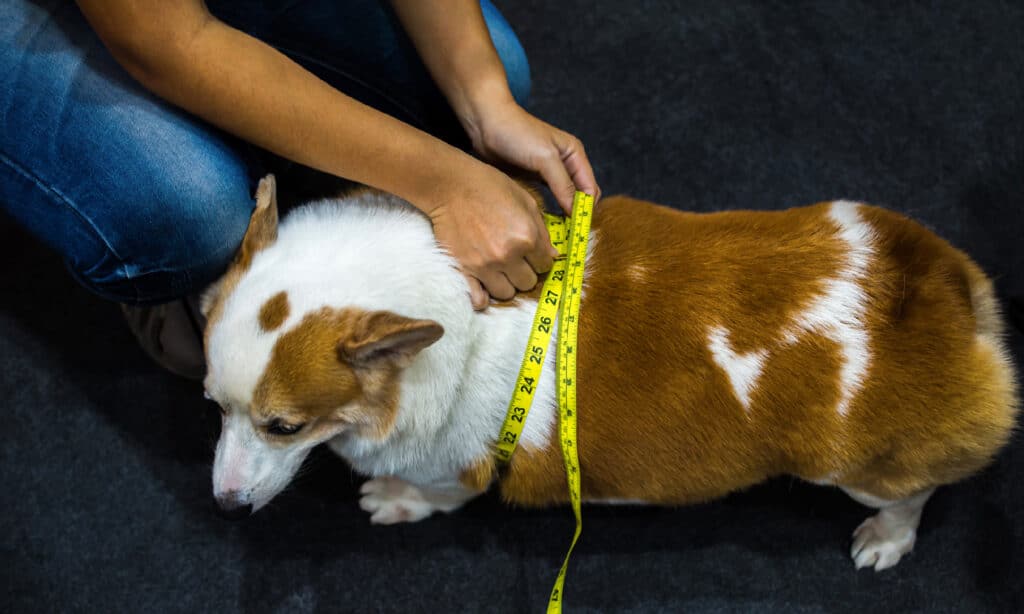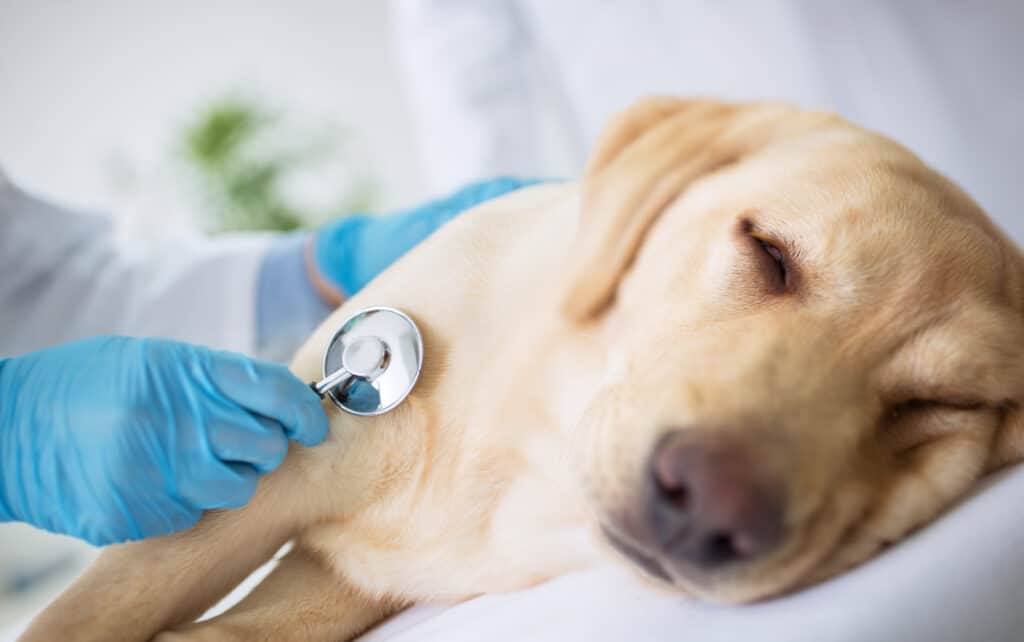Baked beans are a generally healthy part of the human diet, with plenty of fiber and delicious flavors that make them a welcome addition to a family dinner. This may make dog owners wonder if their dogs can eat baked beans, too. And while you might expect an affirmative answer, it isn’t quite that simple.
Whether you are curious about sharing your side dish with your pup or if your dog has slurped up an accidental spill, read on to know whether it’s a good idea for dogs to eat baked beans.

It’s better to avoid feeding your pup baked beans, no matter how much they beg.
©AndrasKiss/Shutterstock.com
Can Dogs Eat Baked Beans?
Simply put, it’s a bad idea for dogs to eat baked beans. While beans on their own aren’t toxic to dogs, the sauces in which they’re cooked might contain potentially harmful ingredients, such as tomato sauce or spices. Err on the safe side: it’s better to avoid feeding your pup baked beans, no matter how much they beg. However, a small quantity of baked beans, eaten accidentally or otherwise, is unlikely to seriously harm your dog.
Are Heinz beans bad for dogs?
It’s inadvisable to feed Heinz baked beans – a brand of canned, pre-cooked baked beans – to your pups. This canned food contains high levels of sugar and preservatives, which can be dangerous for dogs with diabetes or other digestive issues. The tomatoes and ketchup present in Heinz beans are also hazardous for your dog and can upset their stomachs.

It is inadvisable to feed Heinz baked beans to your dog.
©Antony McAulay/Shutterstock.com
What Happens if Dogs Eat Baked Beans?
The additives or potentially toxic ingredients in most recipes are the most harmful components of baked beans. While an entirely homemade dish may have fewer adverse effects absent the preservatives, most baked bean recipes include onions, garlic, and unhealthy levels of sodium, and sugar

©Sergii Koval/Shutterstock.com
If your dog accidentally eats baked beans, it could experience digestive issues, dehydration, and other adverse symptoms. Be sure to monitor your pet for signs of illness and consult a veterinarian as needed
Health Risks of Baked Beans for Dogs
High-saturated fatty foods like baked beans can cause bloat and other digestive issues, hurting your pup’s stomach. Baked beans contain high-fat content, which is difficult for dogs’ stomachs to digest efficiently. Long-term problems related to high-fat diets include increased heart disease risk, obesity, and pancreatitis.
Beans are calorically dense.
Baked beans contain many calories, compromising your dog’s healthy weight and metabolism. It’s unwise to feed your dogs high amounts of dense human food, as your dog could become overweight and develop long-term health conditions related to obesity.

Baked beans contain many calories, compromising your dog’s healthy weight and metabolism.
©iStock.com/PongMoji
Canned beans contain high levels of sodium and other preservatives and stablizers meant to keep the food fresh on the shelf for a long time. Too much salt can dehydrate your dog, and long-term exposure to high sodium can lead to kidney damage or hypernatremia (salt poisoning). Watch for dehydration signs such as excessive thirst, loss of appetite, dry gums, diarrhea, and little urination.
Sugar is unhealthy for dogs, as too much sugar can cause blood sugar issues or more severe diet-related issues such as diabetes and obesity. Some baked beans recipes can contain xylitol, which is highly toxic to dogs, even in tiny amounts.
Toxic ingredients are present.
Most baked bean recipes contain ingredients that are toxic to dogs, even though they’re delicious for humans. Even small amounts can cause vomiting, diarrhea, and upset stomachs. Onion powder, garlic powder, tomatoes, and more are dangerous for dogs, and it’s better to avoid feeding them the food than trying to make baked beans without these ingredients.
Pancreatitis and baked beans
While small amounts of baked beans are less likely to cause significant harm, dogs should not consume them regularly, or they could have an increased risk of pancreatitis, the inflammation of the pancreas. The underlying causes of the disease aren’t always known, but certain dietary factors can heighten your dog’s risk of developing this painful condition. Pancreatitis can feature the following symptoms, though these may relate to other health conditions:
- Increased thirst
- Diarrhea
- Fatigue
- Vomiting
- Lack of appetite
- Swollen abdomen
- Abnormal posture while resting or standing
What should I do if my dog has eaten baked beans?
If your dog has eaten only a tiny quantity of baked beans, they’re likely okay unless your dog has an allergy to any of the recipe’s ingredients. Check the label, and if one of the ingredients listed is xylitol, seek veterinary help immediately. Otherwise, keep an eye on your pup for the next 24 hours after they have eaten baked beans. If you notice any concerning symptoms, such as dehydration or upset stomach issue, reach out to your vet for advice and the next steps.

©didesign021/Shutterstock.com
What Kind of Beans Can Dogs Eat?
Aside from baked beans, there are plenty of perfectly healthy beans and legumes for dogs to eat. Beans are a healthy source of fiber, potassium, iron, and other nutrients, but they should be eaten in moderation and make up no more than 10% of your pup’s diet. Healthy beans for dogs include:
- Black beans
- Pinto beans
- Soybeans
- Green beans
- Garbanzo beans
- Lima beans
- Lentils
- Butter beans
- Kidney beans
When in doubt, it’s best to enjoy baked beans yourself and not give any to your pooch. While a small quantity of baked beans won’t likely harm your dog, they provide zero health benefits and are potentially more harmful than a quick treat is worth.
Up Next
The photo featured at the top of this post is © iStock.com/Peter Horrox
Ready to discover the top 10 cutest dog breeds in the entire world?
How about the fastest dogs, the largest dogs and those that are -- quite frankly -- just the kindest dogs on the planet? Each day, AZ Animals sends out lists just like this to our thousands of email subscribers. And the best part? It's FREE. Join today by entering your email below.
Sources
- cambridge.org, Available here: https://www.cambridge.org/core/journals/journal-of-applied-animal-nutrition/article/navy-and-black-beanbased-dog-foods-are-digestible-during-weight-loss-in-overweight-and-obese-adult-companion-dogs/9DDC6C686BA7C0444BF5E4F4B47EA0DA
- ncbi.nlm.nih.gov, Available here: https://www.ncbi.nlm.nih.gov/pmc/articles/PMC7203193/
- pubmed.ncbi.nlm.nih.gov, Available here: https://pubmed.ncbi.nlm.nih.gov/20473849/
Thank you for reading! Have some feedback for us? Contact the AZ Animals editorial team.






